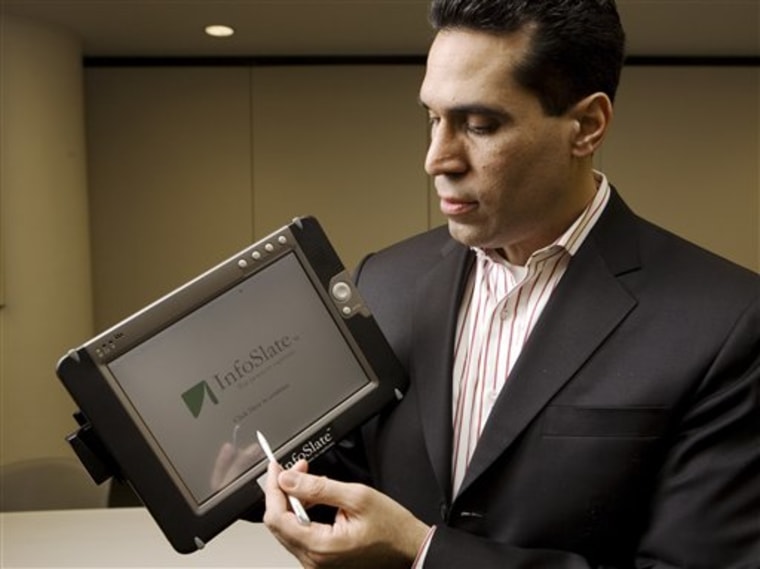For many parents-to-be the excitement and nervousness is often difficult to contain. For Kyle Piechucki, the wait was decidedly boring.
Piechucki, now a father of two who lives in Oyster Bay, N.Y., is no deadbeat — he was ecstatic over the births of each of his children but simply grew tired of interminable waits at doctors' offices. The boredom led Piechucki, 35, to develop a computer for those trapped in the purgatory of the waiting room.
His thin, handheld devices join a parade of efforts aimed at turning once-fallow minutes in the waiting room into productive time for patients and, of course, advertisers. The touch-screen tablets rely on wireless Internet connections to deliver basic information about medical conditions and treatments as well as Internet access.
Advertising in doctors' offices isn't new, of course, but thanks to technology, it's becoming increasingly targeted at individual patients. The thinking goes that bored or curious patients will be eager for fresh alternatives to the waiting room doldrums.
"People are frustrated with waiting. They're bored. They don't want to pick up a stale magazine," said Piechucki, who started distributing the computers through his company, InfoSlate, last year. InfoSlate has placed more than 250 devices in doctors' offices in several states. By year-end he expects to have about 800 tablets in operation and he expects to break even by early 2009.
Companies that have had a presence in waiting rooms for years are also homing in on individual patients. Healthy Advice Networks, a Cincinnati company, places digital screens on waiting room walls and plans to soon introduce digital technology to connect one-on-one with a patient. The company says its existing screens, which air a mix of health information and advertising, reach 100 million patients annually.
Smaller and cheaper computers are making it easier for companies to reach individual patients. Piechucki contends patients are drawn to InfoSlate not just because they can use the computers to complete medical histories and questionnaires, but also to check e-mail and surf the Internet. Doctors also can customize the devices to offer information such as physician biographies and office policies.
While doctors might be weary of the idea of turning a waiting room into a scaled-down Kinko's, InfoSlate, like Healthy Advice Networks, doesn't charge for the services and instead draws revenue from advertising.
"As a doctor one of the most common complaints you get is 'My time is valuable too,'" said Scott Zimmer, director of hand and upper extremity surgery for University Hospitals medical practices in Cleveland. He said patients appreciate having a tool that can make them feel productive while they wait.
The information isn't designed to give patients an instant second opinion but to answer some basic questions. Doctors have used the device, for example, to show expectant mothers video on proper nursing techniques.
"I think people feel like we're trying to give them something back," Zimmer said. He now sits on a panel of doctors that advises Infoslate on medical content. InfoSlate subscribes to services that provide basic medical information. As with Healthy Advice Networks, InfoSlate doesn't allow advertisers to have say over medical content.
Patients looking for answers appear to have the time to do some research. InfoSlate estimates about a quarter of those waiting to see a doctor spend more than 30 minutes; users of InfoSlate's computers spend an average of 20 minutes using the devices.
Advertisers are always looking for fresh ways to infiltrate consumers' minds and people who are content or engaged are more likely to be receptive to a message, said Dennis Roche, president of Zoom Media & Marketing in New York.
"When you're sponsoring something compelling the customer will allow you to solicit them with something," said Roche.
While drug makers and other medical companies have long advertised in doctors' offices, the ability to tailor ads to particular patients brings both opportunities and risks, said James Coyle, a professor of marketing and interactive media at Miami University's Farmer School of Business.
Any advertiser would need to tread carefully, he said: "People are hypersensitive about revealing anything, even if it's rather mundane."
Still, the prospect of at attentive patient waiting to see a doctor is appealing to advertisers.
"We've become experts in avoiding the places where we know ads will appear," Coyle said. "If there is an interactive experience that you can participate with individually — maybe there is more likely to be a more genuine conversation."
Piechucki said the company's handheld units don't overwhelm users with ads nor does the company dangle detailed private patient information before hungry advertisers. Still, ads can relate to a topic a patient might be researching.
"They're going to be able to target their message more effectively," he said of advertisers. "An orthopedic office could have stuff about hip surgery, walkers, crutches and exercise equipment."
But Piechucki said he would avoid any exploitation. After surviving stage four thyroid cancer seven years ago he feels a kinship with those facing cancer.
He spent long hours awaiting and undergoing treatments. Anything that brought temporarily relief was welcome, said Piechucki.
"You brought a book and you have a TV but you know in hospital beds it's not like they have 200 channels. It got boring," he said.
The ability to pass time during cancer treatments is its own brand of treatment, he said, adding that he's pleased if he can offer any relief to these patients.
"That's why I feel a very strong connection to the oncology offices we're in. It's getting their minds off things," he said of the patients.
